Related Research Articles
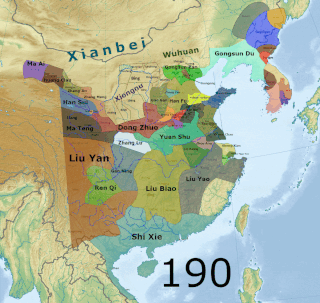
The Three Kingdoms of Cao Wei,Shu Han,and Eastern Wu dominated China from 220 to 280 AD following the end of the Han dynasty. This period was preceded by the Eastern Han dynasty and followed by the Western Jin dynasty. Academically,the periodisation begins with the establishment of Cao Wei in 220 and ends with the conquest of Wu by Jin in 280. The period immediately preceding the Three Kingdoms from 184 to 220 was marked by chaotic infighting among warlords across China as Han authority collapsed. The period from 220 to 263 was marked by a comparatively stable arrangement between Cao Wei,Shu Han,and Eastern Wu. This stability broke down with the conquest of Shu by Wei in 263,followed by the usurpation of Cao Wei by Jin in 266,and ultimately the conquest of Wu by Jin in 280.

The Jin dynasty or Jin Empire,sometimes distinguished as the Sima Jin or the Two Jins,was an imperial dynasty in China that existed from 266 to 420. It was founded by Sima Yan,eldest son of Sima Zhao,who had previously been declared the King of Jin. There are two main divisions in the history of the dynasty. The Western Jin (266–316) was established as the successor to Cao Wei after Sima Yan usurped the throne from Cao Huan and took the title of Emperor Wu. The capital of the Western Jin was initially in Luoyang,though it later moved to Chang'an. In 280,after conquering Eastern Wu,the Western Jin ended the Three Kingdoms period and reunited China proper for the first time since the end of the Han dynasty.
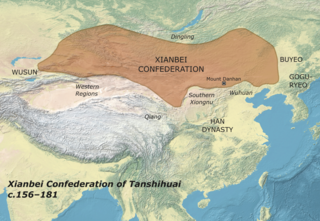
The Xianbei were an ancient nomadic people that once resided in the eastern Eurasian steppes in what is today Mongolia,Inner Mongolia,and Northeastern China. The Xianbei were strongly suggested to be a multilingual,multi-ethnic confederation consisting of mainly Proto-Mongols,and,to a minor degree,Tungusic and Turkic peoples. They originated from the Donghu people who splintered into the Wuhuan and Xianbei when they were defeated by the Xiongnu at the end of the third century BC. Following the split,the Xianbei people did not have a direct contact with the Han dynasty,residing to the north of the Wuhuan. In the first century BC,the Xianbei began to actively engage in the struggle between the Han and Xiongnu,which culminated in the Xianbei replacing the Xiongnu on the Mongolian Plateau in 93 AD.

Romance of the Three Kingdoms is a 14th-century historical novel attributed to Luo Guanzhong. It is set in the turbulent years towards the end of the Han dynasty and the Three Kingdoms period in Chinese history,starting in 184 AD and ending with the reunification of the land in 280 by the Western Jin. The novel is based primarily on the Records of the Three Kingdoms,written by Chen Shou in the 3rd century.

A commandery was a historical administrative division of China that was in use from the Eastern Zhou until the early Tang dynasty. Several neighboring countries adopted Chinese commanderies as the basis for their own administrative divisions.

Wei was one of the major dynastic states in China during the Three Kingdoms period. The state was established in 220 by Cao Pi based upon the foundations laid by his father Cao Cao during the end of the Han dynasty. Its capital was initially located at Xuchang,and was later moved to Luoyang.
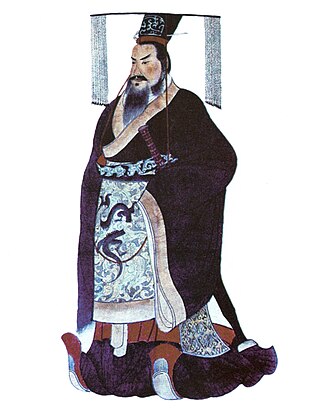
The nobility of China represented the upper strata of aristocracy in premodern China,acting as the ruling class until c. 1000 CE,and remaining a significant feature of the traditional social structure until the end of the imperial period.

The Han-Zhao,or Former Zhao,was a dynastic state of China ruled by the Liu (Luandi) clan of Xiongnu ethnicity during the Sixteen Kingdoms period of Chinese history. In Chinese historiography,it was given two conditional state titles,the Northern Han for the state proclaimed in 304 by Liu Yuan,and the Former Zhao for the state proclaimed in 319 by Liu Yao. The reference to them as separate states should be considered misleading,given that when Liu Yao changed the name of the state from “Han”to “Zhao”in 319,he treated the state as having been continuous from the time that Liu Yuan founded it in 304;instead,he de-established his imperial lineage from the Han dynasty and claimed ancestry directly from Modu Chanyu.
Sima is a Chinese family name. It is one of the rare two-character Chinese family names;most Chinese family names consist of only a single character. It is an occupational surname,literally meaning "control" (sī) "horses" (mǎ),or "horse officer". The family name originated from one of the offices of the Zhou dynasty.
Master of the Horse is an official position in several European nations. It was more common when most countries in Europe were monarchies,and is of varying prominence today.
The Gonghe Regency was an interregnum period in Chinese history from 841 BC to 828 BC,after King Li of Zhou was exiled by his nobles during the Compatriots Rebellion,when the Chinese people rioted against their old corrupt king. It lasted until the ascension of King Li's son,King Xuan of Zhou.
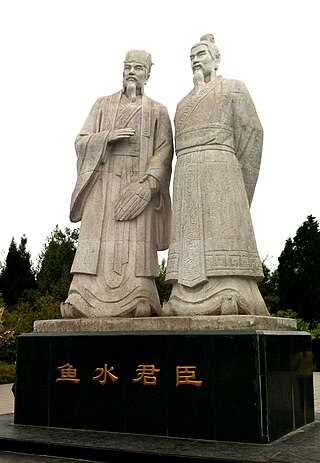
The grand chancellor,also translated as counselor-in-chief,chancellor,chief councillor,chief minister,imperial chancellor,lieutenant chancellor and prime minister,was the highest-ranking executive official in the imperial Chinese government. The term was known by many different names throughout Chinese history,and the exact extent of the powers associated with the position fluctuated greatly,even during a particular dynasty.

Guanzhong region,also known as the Guanzhong Basin,Wei River Basin,or uncommonly as the Shaanzhong region,is a historical region of China corresponding to the crescentic graben basin within present-day central Shaanxi,bounded between the Qinling Mountains in the south,and the Huanglong Mountain,Meridian Ridge and Long Mountain ranges in the north. The central flatland area of the basin,known as the Guanzhong Plain,is made up of alluvial plains along the lower Wei River and its numerous tributaries and thus also called the Wei River Plain. The region is part of the Jin-Shaan Basin Belt,and is separated from its geological sibling —the Yuncheng Basin to its northeast —by the Yellow River section southwest of the Lüliang Mountains and north of the river's bend at the tri-provincial junction among Shaanxi,Shanxi and Henan.
The Three Ducal Ministers,also translated as the Three Dukes,Three Excellencies,or the Three Lords,was the collective name for the three highest officials in Ancient China and Imperial China. These posts were abolished by Cao Cao in 208 AD and replaced with the position of Grand Chancellor. When Cao Cao's son Cao Pi became King of Wei after his father's death,he reinstated the three positions. Hua Xin was made Chancellor,Jia Xu was made Grand Commandant and Wang Lang was made Grand Secretary. When Cao Pi declared himself emperor in late 220,Hua Xin was made Cao Wei's first Minister of the Masses,Jia Xu remained as Grand Commandant,and Wang Lang was made the first Minister of Works.

King Wen of Zhou was the posthumous title given to Ji Chang,the patriarch of the Zhou state during the final years of Shang dynasty in ancient China. Ji Chang himself died before the end of the Zhou-Shang War,and his second son Ji Fa completed the conquest of Shang following the Battle of Muye,and posthumously honored him as the founder of the Zhou dynasty. Many of the hymns of the Classic of Poetry are praises to the legacy of King Wen. Some consider him the first epic hero of Chinese history.
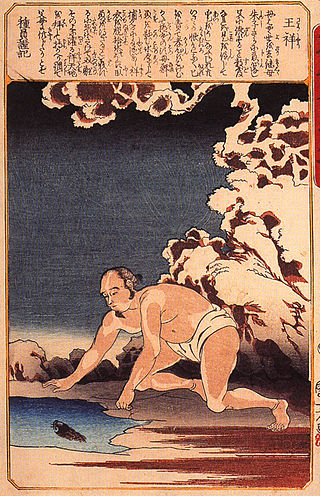
Wang Xiang,courtesy name Xiuzheng,was a Chinese politician who lived through the late Eastern Han dynasty (25–220),the Three Kingdoms period (220–280),and the early Western Jin dynasty (266–316) of China. He served in the highest positions in the government,including Minister of Works (司空) and Grand Commandant (太尉) in the Cao Wei state during the Three Kingdoms period,and Grand Protector (太保) during the Western Jin dynasty. He was also one of The Twenty-four Filial Exemplars.

The Xianyun was an ancient nomadic tribe that invaded the Zhou dynasty. This Chinese exonym is written with xian獫 or 玁 "long-snouted dog",and this "dog" radical 犭is commonly used in graphic pejorative characters. "Xianyun" was the preferred designation for northern tribes during the Zhou dynasty,earlier designations being the Xunyu,Guifang,and later ones being the Xiongnu,during the Han dynasty.
Six Dynasties poetry refers to those types or styles of poetry particularly associated with the Six Dynasties era of China. This poetry reflects one of the poetry world's more important flowerings,as well as being a unique period in Classical Chinese poetry,which,over this time period,developed a poetry with special emphasis on romantic love,gender roles,and human relationships. The Six Dynasties era is sometimes known as the "Age of Fragmentation",because China as a whole through this period lacked unification as a state,at least for any extended period of time;and,instead,many states rose and fell,often overlapping in existence with other states. Which of the various states and dynasties constituted the "6" dynasties of the Six Dynasties period varies somewhat according to which of the traditional selection criteria are chosen. The Six Dynasties era covers several somewhat overlapping main periods including all of the following:the Three Kingdoms (220–280),Jin dynasty,the Sixteen Kingdoms,and the Southern and Northern Dynasties (420–589). Sometimes,chronological discrepancies occur in regard to the turbulent political events of the time,from which these traditional historical-era designations derive,together with the somewhat different chronology of poetic developments. Thus,neither the lives of the poets nor the trends in their poetry fit gently and neatly together with these period dates. Furthermore,conversions to the Common Era dating system can create further complications. However,regardless of the chronological difficulties,major developments of poetry during the Six Dynasties include formalizing the distinction between the Jian'an era regular yuefu and the shi style poetry,further development of the fu,theoretical work on technique,and the preservation of both Six Dynasties and earlier poetry by collecting and publishing many of the pieces which survive today into various anthologies consisting all or in part of poetry.

The History of fu poetry covers the beginnings of the Chinese literary genre of fu. The term fu describes literary works which have certain characteristics of their own. English lacks an equivalent native term. Sometimes called "rhapsodies",sometimes called "rhyme-prose",fu are characterized by qualities of both poetry and prose:both are obligatory. The fu form of literary work is a treatment in a poetic manner,wherein some topic of interest,such as an exotic object,a profound feeling,or an encyclopedic subject is described and rhapsodized upon,in exhaustive detail and various angles of view. And,for a piece to be truly considered to be within the fu genre,it must follow the rules of this form,in terms of structure,meter,and so on.
Ranged Marquis was a rank of the Chinese nobility that existed from the Warring States period to the Chen dynasty.
References
- ↑ Gu Hanyu Da Cidian. Shanghai Lexicographical Publishing House.
- ↑ Edward H. Schafer (May 1954). "Non-Translation and Functional Translation--Two Sinological Maladies". The Far Eastern Quarterly. 13 (3). Association for Asian Studies: 257. doi:10.2307/2942278. JSTOR 2942278.
- ↑ "Official Titles of the Han Dynasty: A Tentative List Compiled for The Han Dynasty History Project" (PDF). University of Washington. p. 31. Retrieved March 21, 2013.